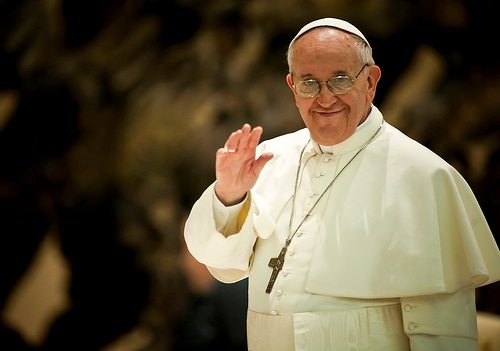
June 26, 2014; National Catholic Reporter
Catholic bishops probably grimace every time The Verdict, starring the late Paul Newman, is rerun on TV. As an alcoholic, downtrodden lawyer, Newman as Frank Galvin faces off against Ed Concannon, played by James Mason, sneering his way through his role as the high priced lawyer for Bishop Brophy (Edward Binns) and the opulent Boston Archdiocese rather callously fending off a medical malpractice suit.
That kind of opulence of the Catholic Church is a thing of the past in some places. In Philadelphia, for example, the archdiocese just announced the closing of 16 parishes. It’s obviously only the most recent closing/merger dynamic in the archdiocese. As recently as 2010, the Philadelphia archdiocese comprised 266 parishes, but will now shrink to 219. Spokespersons for the archdiocese attributed the closings to shrinking church attendance and shifting populations, but it’s not hard to see the financial strain beneath the decision-making. According to Charles Zech of Villanova University’s Center for Church Management and Business Ethics, “The archdiocese is in a terrible financial situation in part due to subsidizing parishes that can’t support themselves. Frankly, that’s not good stewardship.” He said that the plan of closing and mergers of parishes was “long overdue.”
Do the financial strains in the parishes filter up to the level of the fictional Bishop Brophy in his comfortable offices as he determined with lawyer Concannon just how cheaply they could buy off the plaintiffs in the malpractice suit? Are leaders of the church cutting back on lavish expenditures and lifestyles? At the recent semi-annual meeting of U.S. Roman Catholic bishops, something else was pushing them, according to Michael Paulson of the New York Times, to “rethink…what kinds of houses they live in, and what kinds of cars they drive.”
It is the example of how Pope Francis is conducting himself on the national stage. According to Paulson, the bishops “find themselves unsettled in ways large and small, revisiting both how they live and what they talk about in light of the new pope’s emphasis on personal humility and economic justice.”
Sign up for our free newsletters
Subscribe to NPQ's newsletters to have our top stories delivered directly to your inbox.
By signing up, you agree to our privacy policy and terms of use, and to receive messages from NPQ and our partners.
“After several of their colleagues faced recent criticism for lavish houses,” Paulson wrote, “several bishops said in interviews that they were paying new attention to their own spending, mindful of the pope’s decision to eschew the apostolic palace for a small suite in a Vatican guesthouse, and aware that their parishioners are concerned about how the church uses its money.”
It’s a problem of keeping up with the Pope. “The Pope Francis Effect,” some call it.
Look at the problems Pope Francis has created for the formerly high-living bishops just in the past couple of weeks. The other day, he had his motorcade stop in a small Italian village to kiss a disabled woman lying on a stretcher. The Vatican announced recently that Francis would meet with Irish victims of sexual abuse at the hands of clerics, accompanied by other survivors from the U.S., Poland, and the UK. Unlike his predecessors (and some other church leaders) who had embarrassingly close relations with organized crime, Pope Francis chose this month to finally excommunicate the Mafia, though some sources question whether he officially excommunicated the entire mob or simply said that they were inexcusably evil and Mafiosi should be excommunicated. He appears to be living his beliefs in a simple, human kind of religion, without the trappings of affluence and excess.
“Just when they thought they had mastered the art of pleasing popes like St. John Paul II and Benedict XVI, along comes Pope Francis to throw them into turmoil about how to remake themselves in his image and likeness,” writes Eugene Cullen Kennedy, a psychology professor at Loyola University, about the U.S. bishops in an article in the National Catholic Reporter. While describing bishops as “bright ambitious men” whose “principal motivation…was that, at sunset, their actions and decisions of the completed day would be pleasing to and approved by the pope” (a conclusion he draws from the Sheehan/Kobler study of U.S. bishops), Kennedy thinks that their ability to please this pope might be challenging.
“They must have known that Pope Francis was trouble the minute he got on the bus with the other cardinals after he was elected…He rejected the papal apartments and bought a secondhand car that would delight environmentalists and/or junk men. When a reporter asked him about a priest accused of homosexuality, he answered, as naturally as a man who is a pastor by nature, ‘Who am I to judge?’”
Kennedy writes, “The bishops’ worry is not apparently about what the pastoral pope does or says. It is the dismay they feel at being expected to speak spontaneously like a Christian, to share the concern that lives in their hearts rather than lies dead in canon law books. Being a true Christian is all that the pope seems to expect, but nobody ever prepared the present bishops for that, and the thought never occurred to them spontaneously.”
Kennedy’s article is a scathing commentary about the U.S. Bishops. It certainly applies to bishops with the image of Bishop Brophy in The Verdict, so distant from and so unfeeling toward the poor family who lost their sister in a Catholic hospital. Does it apply to today’s U.S. bishops? Archbishop Charles J. Chaput of Philadelphia is trying to get Pope Francis to visit next year in conjunction with the city’s hosting of the World Meeting of Families. If the Pope makes his first visit to the U.S. next year, will he see bishops simply striving to please their leader, or really being what the Pope seems to want—true Christians?—Rick Cohen













